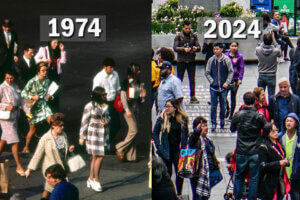Pres. Barack Obama has now laid out his plans for the coming year. The question remains whether political polarization in Washington and throughout the country will stymie those efforts and lead to more gridlock. The Al Jazeera America/Monmouth University Poll finds that most Americans believe an aversion to compromise in D.C. is a major stumbling block to progress – unless perhaps it is their own partisan principles that are being called into question.
According to the poll, both the conservative and moderate wings of the Republican Party agree that ideological activists have too much power, but conservatives still feel that elected officials don’t stand by their principles enough. On the other hand, Democrats, regardless of their ideological bent, are less likely than Republicans to feel that the parties’ base activists hold too much sway and they are much more concerned about the lack of compromise in Washington than they are by the lack of principled stands. Of course, Democrats are now in the minority in both houses of Congress.
More Americans say that elected officials being unwilling to compromise (54%) is a bigger problem for the federal government than representatives who won’t stand up for their principles (36%). There is a significant partisan divide in this opinion. More than two-thirds (71%) of Democrats and a majority (52%) of independents lament the lack of compromise in Washington. Republicans, though, are more likely to say that an unwillingness to stick to one’s principles (49%) is a bigger problem in D.C. today than an unwillingness to compromise (40%). Tea Party supporters are even more likely to say that Washington’s problems stem more from a lack of principle (57%) than a lack of compromise (37%).
The poll found some interesting regional difference in this opinion suggesting that the prevailing political culture in one’s state may play a role in the typical voter’s willingness to accept compromise from their party’s federal representatives. Residents of twenty “swing” or competitive states – where the winning margin for president in 2012 was less than 12 percentage points – are more likely to say the lack of compromise (57%) is a bigger problem in Washington than the lack of principled stands (34%). This break in opinion is similar in states that Obama won by more than 12 points – more “blue” state residents see the lack of compromise (60%) as a bigger problem than lack of principles (30%). In “red” states that went solidly for Mitt Romney, more residents see a lack of principles (50%) as the federal government’s bigger problem than say it is the lack of compromise (41%).
Democrats who live in swing (80%), blue (65%) and red (57%) largely see a lack of compromise as the bigger failing in Washington. Republicans who live in swing (51%) and red (56%) states see lack of principled stands as the bigger problem, but Republicans living among Democratic majorities in blue states are more likely to point to the lack of compromise (51%). Independents living in swing (53%) and blue (61%) states are more likely to bemoan the lack of compromise in D.C., but independents living in red states are more concerned about elected officials not standing up for their principles (55%) at levels similar to their Republican neighbors in those states.
The poll also asked about the influence of activists who form the ideological base of each party. Four-in-ten (40%) say these activists have too much influence over members of Congress compared to 27% who say they have too little influence and just 19% who say they have the right amount of influence. Another 15% are not sure how much sway activists in the partisan base hold over Congress.
Republicans (47%) and independents (44%) are more likely than Democrats (28%) to feel the parties’ base voters carry too much weight in Congress. Democrats (36%) are somewhat more likely than independents (25%) and Republicans (22%) to feel that the base does not have enough influence.
Similarly, self-described conservatives (47%) are more likely than moderates (39%) and liberals (30%) to feel the base has too much influence in Washington. Those who either support (46%) or oppose (49%) the Tea Party are more likely than Americans who are neutral about the Tea Party (35%) to say that the base has too much power over Congress.
“Partisans seem to be schizophrenic about political polarization. Democrats want to see more influence from the base but also want greater compromise. Conservatives want their elected leaders to stick to their principles, but believe the base holds too much sway,” said Patrick Murray, director of the Monmouth University Polling Institute, which conducted the Al Jazeera America/Monmouth University Poll. “One question this raises is whether conservatives think of themselves as the GOP base or if they are worried about the Tea Party wing’s ascendance. These mixed messages underscore the difficulty of reaching compromise in Washington. It’s no wonder our government is beset by gridlock”
The Al Jazeera America/Monmouth University Poll asked Republicans and Democrats how willing they would be to see their respective party’s members in Congress compromise on nine different policy areas. In nearly all cases, a majority of partisans said they would be at least somewhat willing to see their side compromise, although Democrats are more likely than Republicans to feel this way on most issues.
Specifically, Democrats are more likely than Republicans to be at least somewhat willing to have their party’s Congressional caucus compromise on the national debt (79% Dem compared to 60% GOP), health care (73% Dem to 61% GOP), taxes (79% Dem to 68% GOP), immigration (71% Dem to 56% GOP), and gun ownership (60% Dem to just 48% GOP). Partisans from both sides of the aisle are more likely to see eye to eye on compromise around education (80% Dem to 74% GOP), defense spending (72% Dem to 69% GOP), energy production (74% Dem to 75% GOP), and Social Security (72% Dem to 68% GOP).
| WILLINGNESS TO HAVE THEIR PARTY’S CONGRESSIONAL REPUBLICANS | ||||||||
|
ALL | IDEOLOGY |
TEA PARTY | ||||||
| Issue: | Total (very+ | VERY WILLING | Moderate/ Liberal | Somewhat Conservative | Very Conservative | Neutral/ Oppose | Support | |
| Education | 74% | 37% | 37 | 34 | 37 | 39 | 27 | |
| Defense | 69% | 33% | 32 | 28 | 41 | 31 | 37 | |
| Energy | 75% | 32% | 33 | 22 | 43 | 32 | 30 | |
| Social Security | 68% | 32% | 31 | 26 | 41 | 31 | 33 | |
| Debt | 60% | 31% | 28 | 26 | 41 | 33 | 31 | |
| Health care | 61% | 28% | 27 | 23 | 31 | 30 | 23 | |
| Taxes | 68% | 25% | 25 | 20 | 26 | 25 | 27 | |
| Immigration | 56% | 21% | 24 | 15 | 27 | 24 | 22 | |
| Guns | 48% | 21% | 19 | 17 | 27 | 22 | 19 | |
| DEMOCRATS | ||||||||
|
ALL | IDEOLOGY |
TEA PARTY | ||||||
| Issue: | Total (very+ | VERY WILLING | Moderate/ Conservative | Somewhat Liberal | Very Liberal | Neutral/ Support | Oppose | |
| Education | 80% | 46% | 46 | 43 | 42 | 53 | 34 | |
| Defense | 72% | 29% | 29 | 26 | 24 | 34 | 21 | |
| Energy | 74% | 37% | 38 | 32 | 34 | 43 | 30 | |
| Social Security | 72% | 40% | 42 | 36 | 31 | 52 | 25 | |
| Debt | 79% | 39% | 39 | 39 | 33 | 46 | 29 | |
| Health care | 73% | 41% | 44 | 34 | 33 | 45 | 32 | |
| Taxes | 79% | 35% | 39 | 24 | 34 | 40 | 28 | |
| Immigration | 71% | 34% | 33 | 37 | 32 | 37 | 30 | |
| Guns | 60% | 29% | 31 | 22 | 25 | 35 | 21 | |
A more telling indicator of party supporters’ appetite for compromise is the percentage who say they are very willing to see their Congressional representatives agree to concessions. Republicans’ disposition for compromise ranges from 37% who are very willing to compromise on their party’s position on education to just 1-in-5 who are very willing to compromise on immigration (21%) and guns (21%). Democrats are most likely to be very willing to compromise on education (46%) but least likely to compromise on defense spending (29%) and guns (29%).
“If Congressional leaders are looking to work in a bipartisan manner on an issue to show they can break Washington gridlock, the poll suggests that education may be a fruitful area to focus on than guns or immigration,” said Murray.
Among Republicans, those who describe their views as very conservative are actually more likely to be very willing to compromise on energy (43%), defense spending (41%), social security (41%), and the debt (41%) when compared with less conservative members of the party. On the other hand, Republican partisans who describe themselves as Tea Party supporters are less likely than others in the GOP to be very willing to compromise on education (27%) and health care (23%).
On the Democratic side of the aisle, there is very little difference in the willingness to compromise based on political ideology – liberals and moderates are about equally prone to be very willing to compromise on the nine issues included in the poll. However, Tea Party opponents in the Democratic ranks are significantly less willing to compromise on any issue when compared to Democrats who are not as concerned about the Tea Party movement.
“The Tea Party provokes a strong reaction across the board. The poll results suggest that Tea Party opponents may be worried that compromise would actually lead to capitulation by Congressional Democrats,” said Murray. “It seems the rise of the Tea Party has contributed to the present reluctance to compromise by Democrats and Republicans alike. This impasse is not only seen in the halls of Congress, but on Main Street America as well.”
Most Americans actually take either a neutral view (48%) or express no opinion (11%) of the Tea Party movement. Among the remainder, more are opposed (26%) than are supportive (16%). Among Republicans, 28% are Tea Party supporters and just 7% are opposed, with 50% staying neutral and 15% expressing no opinion. Among Democrats, 47% oppose the Tea Party and just 6% are supportive, with 40% remaining neutral and 8% expressing no opinion.
It is also worth noting that 34% of Americans describe themselves as conservative, 20% say their views are liberal, and 40% see themselves as politically moderate, according to the Al Jazeera America/Monmouth University Poll. Among Republican identifiers, 61% say they are conservative. Among Democrats, 44% see themselves as liberals.
The Al Jazeera America/Monmouth University Poll was conducted by telephone from January 13 to 15, 2015 with 1,003 adults in the United States. This sample has a margin of error of ± 3.1 percent. The poll was conducted by the Monmouth University Polling Institute in West Long Branch, N.J. and cosponsored by Al Jazeera America in New York, N.Y.
The questions referred to in this release are as follows:
(* Some columns may not add to 100% due to rounding.)
undefined. What causes more problems in the federal government — [CHOICES WERE ROTATED] elected officials who are not willing to stand up for their principles or elected officials who are not willing to compromise?
|
TOTAL |
PARTY ID | IDEOLOGY |
TEA PARTY | |||||||
|
Rep | Ind | Dem | Liberal | Moderate | Conservative | Support | Neutral |
Oppose | ||
| not willing to stand up for principles | 36% | 49% | 39% | 20% | 25% | 32% | 49% | 57% | 37% | 19% |
| not willing to compromise | 54% | 40% | 52% | 71% | 68% | 59% | 40% | 37% | 52% | 76% |
| (VOL) Depends/Don’t know | 9% | 11% | 9% | 8% | 7% | 9% | 12% | 6% | 11% | 5% |
2. Do activists who form the ideological base of the parties have too much, not enough, or the right amount of influence over members of Congress?
|
TOTAL |
PARTY ID | IDEOLOGY |
TEA PARTY | |||||||
|
Rep | Ind | Dem | Liberal | Moderate | Conservative | Support | Neutral |
Oppose | ||
| Too much | 40% | 47% | 44% | 28% | 30% | 39% | 47% | 46% | 35% | 49% |
| Not enough | 27% | 22% | 25% | 36% | 33% | 26% | 25% | 25% | 28% | 27% |
| Right amount | 19% | 16% | 18% | 22% | 23% | 19% | 16% | 18% | 22% | 15% |
| (VOL) Depends/Don’t know | 15% | 15% | 13% | 15% | 14% | 16% | 13% | 10% | 15% | 9% |
[The following question was asked of partisan identifiers about their own party]
3. I’m going to read you a list of issues. For each one, please tell me how willing you would be to have the [Republicans/Democrats] in Congress compromise on that issue in order to get something done on the issue. Would you be very willing, somewhat willing, not too willing, or not at all willing to see your party’s elected officials compromise on [READ ITEM]? [ITEMS WERE ROTATED]
| Among Republicans & Republican leaners: n=429, moe=+/-4.7% |
Very | Somewhat willing | Not too willing | Not at all willing |
(VOL) |
| Fuel and energy production issues | 32% | 43% | 9% | 12% | 4% |
| Defense spending | 33% | 36% | 9% | 18% | 4% |
| Gun ownership | 21% | 27% | 9% | 39% | 4% |
| Immigration | 21% | 35% | 12% | 27% | 5% |
| Taxes | 25% | 43% | 10% | 18% | 4% |
| Social Security | 32% | 36% | 10% | 17% | 5% |
| The national debt | 31% | 29% | 14% | 22% | 4% |
| Education policy | 37% | 37% | 8% | 12% | 6% |
| Health care policy | 28% | 33% | 9% | 26% | 3% |
| Among Democrats & Democrat leaners: n=407, moe=+/-4.9% | Very willing | Somewhat willing | Not too willing | Not at all willing | (VOL) Depends Don’t know |
| Fuel and energy production issues | 37% | 37% | 10% | 9% | 7% |
| Defense spending | 29% | 43% | 11% | 9% | 7% |
| Gun ownership | 29% | 31% | 12% | 21% | 7% |
| Immigration | 34% | 37% | 12% | 13% | 5% |
| Taxes | 35% | 44% | 7% | 9% | 5% |
| Social Security | 40% | 32% | 10% | 14% | 4% |
| The national debt | 39% | 40% | 8% | 8% | 5% |
| Education policy | 46% | 34% | 7% | 9% | 4% |
| Health care policy | 41% | 32% | 9% | 14% | 4% |
4. In general, would you describe your political views as liberal, moderate, or conservative? [Is that very or somewhat liberal/conservative?]
|
TOTAL |
PARTY ID | GENDER |
AGE | ||||||
|
Rep | Ind | Dem | Male | Female | 18-34 | 35-54 |
55+ | ||
| Very liberal | 9% | 2% | 6% | 22% | 8% | 11% | 12% | 9% | 8% |
| Somewhat liberal | 11% | 3% | 9% | 22% | 9% | 14% | 11% | 11% | 12% |
| Moderate | 40% | 33% | 49% | 35% | 39% | 41% | 43% | 39% | 39% |
| Somewhat conservative | 21% | 31% | 20% | 14% | 21% | 20% | 19% | 21% | 22% |
| Very conservative | 13% | 30% | 9% | 3% | 16% | 10% | 6% | 16% | 15% |
| (VOL) Don’t know | 5% | 2% | 6% | 5% | 8% | 3% | 8% | 4% | 4% |
5. Do you support, oppose, or are you neutral about the Tea Party movement? [Do you support/oppose it strongly or just somewhat?]
|
TOTAL |
PARTY ID | GENDER |
AGE | ||||||
|
Rep | Ind | Dem | Male | Female | 18-34 | 35-54 |
55+ | ||
| Strongly support | 7% | 15% | 6% | 2% | 9% | 5% | 2% | 9% | 9% |
| Somewhat support | 9% | 13% | 9% | 4% | 10% | 7% | 5% | 10% | 10% |
| Neutral | 48% | 50% | 52% | 40% | 45% | 51% | 57% | 48% | 41% |
| Somewhat oppose | 8% | 4% | 7% | 11% | 9% | 6% | 8% | 7% | 8% |
| Strongly oppose | 18% | 3% | 15% | 36% | 17% | 19% | 15% | 18% | 21% |
| (VOL) Don’t know | 11% | 15% | 10% | 8% | 10% | 12% | 13% | 9% | 11% |
The Al Jazeera America/Monmouth University Poll was sponsored by Al Jazeera America and the Monmouth University Polling Institute. Monmouth is responsible for all aspects of the survey design, data weighting and analysis. The poll was conducted from January 13 to 15, 2015 with a national random sample of 1,003 adults age 18 and older. This includes 673 contacted by a live interviewer on a landline telephone and 330 contacted by a live interviewer on a cell phone, in English. Final sample is weighted for region, age, education, gender and race based on US Census information. Data collection support provided by Braun Research (field) and SSI (RDD sample). For results based on this sample, one can say with 95% confidence that the error attributable to sampling has a maximum margin of plus or minus 3.1 percentage points (unadjusted for sample design). Sampling error can be larger for sub-groups (see table below). In addition to sampling error, one should bear in mind that question wording and practical difficulties in conducting surveys can introduce error or bias into the findings of opinion polls.
|
POLL DEMOGRAPHICS (weighted) | |||
| 26% Rep | 49% Male | 31% 18-34 |
65% White |
| 44% Ind | 51% Female | 38% 35-54 |
12% Black |
| 30% Dem | 31% 55+ |
15% Hispanic | |
|
8% Asian/Other | |||
Click on pdf file link below for full methodology and results by key demographic groups.




